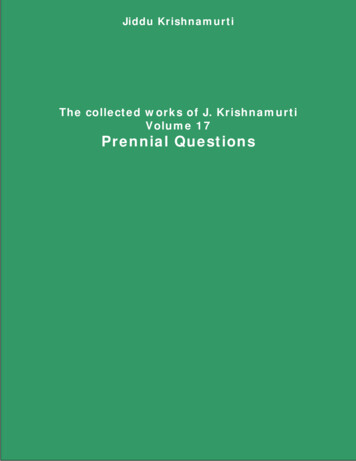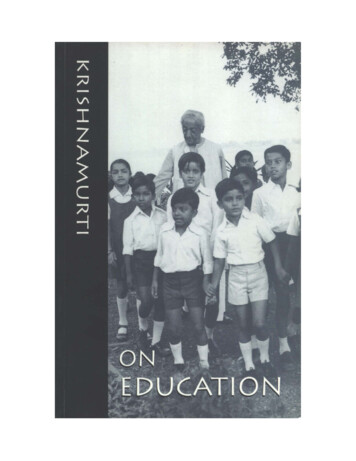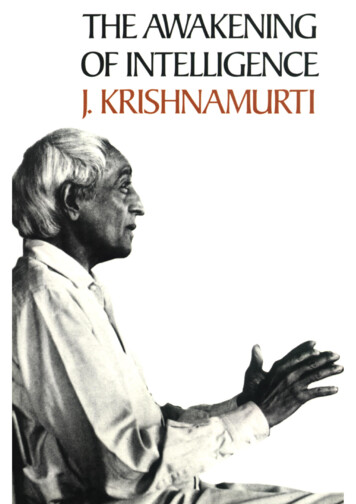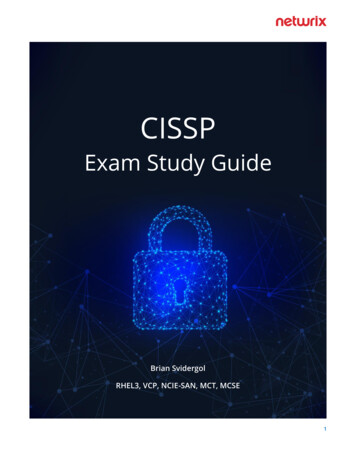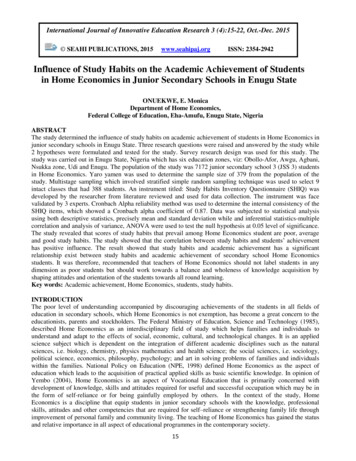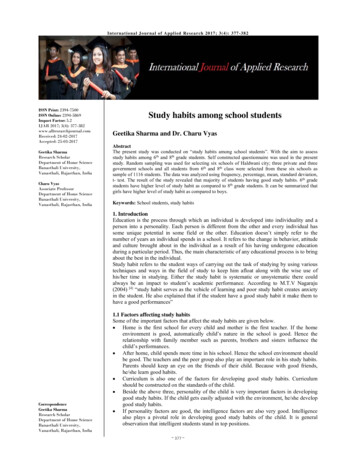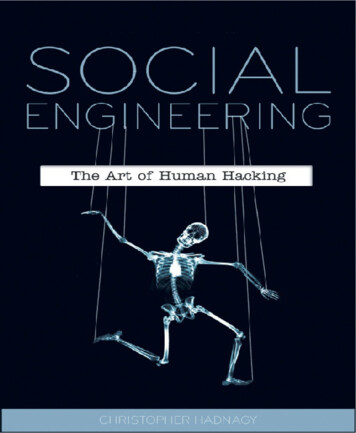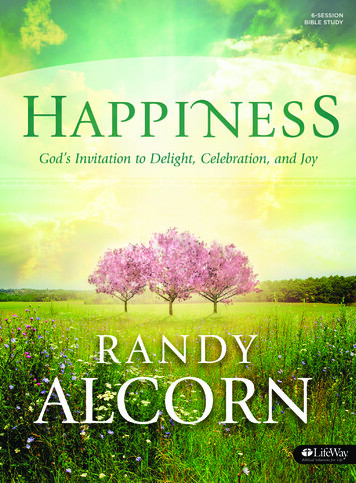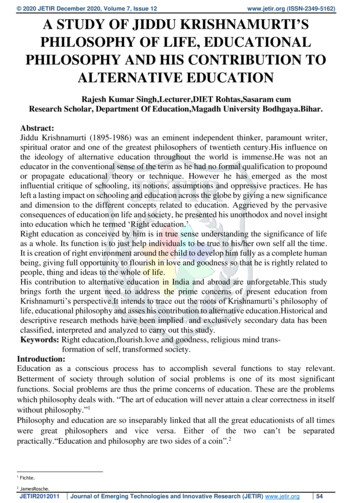
Transcription
2020 JETIR December 2020, Volume 7, Issue 12www.jetir.org (ISSN-2349-5162)A STUDY OF JIDDU KRISHNAMURTI’SPHILOSOPHY OF LIFE, EDUCATIONALPHILOSOPHY AND HIS CONTRIBUTION TOALTERNATIVE EDUCATIONRajesh Kumar Singh,Lecturer,DIET Rohtas,Sasaram cumResearch Scholar, Department Of Education,Magadh University Bodhgaya.Bihar.Abstract:Jiddu Krishnamurti (1895-1986) was an eminent independent thinker, paramount writer,spiritual orator and one of the greatest philosophers of twentieth century.His influence onthe ideology of alternative education throughout the world is immense.He was not aneducator in the conventional sense of the term as he had no formal qualification to propoundor propagate educational theory or technique. However he has emerged as the mostinfluential critique of schooling, its notions, assumptions and oppressive practices. He hasleft a lasting impact on schooling and education across the globe by giving a new significanceand dimension to the different concepts related to education. Aggrieved by the pervasiveconsequences of education on life and society, he presented his unorthodox and novel insightinto education which he termed ‘Right education.’Right education as conceived by him is in true sense understanding the significance of lifeas a whole. Its function is to just help individuals to be true to his/her own self all the time.It is creation of right environment around the child to develop him fully as a complete humanbeing, giving full opportunity to flourish in love and goodness so that he is rightly related topeople, thing and ideas to the whole of life.His contribution to alternative education in India and abroad are unforgetable.This studybrings forth the urgent need to address the prime concerns of present education fromKrishnamurti’s perspective.It intends to trace out the roots of Krishnamurti’s philosophy oflife, educational philosophy and asses his contribution to alternative education.Historical anddescriptive research methods have been implied and exclusively secondary data has beenclassified, interpreted and analyzed to carry out this study.Keywords: Right education,flourish.love and goodness, religious mind transformation of self, transformed society.Introduction:Education as a conscious process has to accomplish several functions to stay relevant.Betterment of society through solution of social problems is one of its most significantfunctions. Social problems are thus the prime concerns of education. These are the problemswhich philosophy deals with. “The art of education will never attain a clear correctness in itselfwithout philosophy.”1Philosophy and education are so inseparably linked that all the great educationists of all timeswere great philosophers and vice versa. Either of the two can’t be separatedpractically.“Education and philosophy are two sides of a coin”.212Fichte.JamesRosche.JETIR2012011Journal of Emerging Technologies and Innovative Research (JETIR) www.jetir.org54
2020 JETIR December 2020, Volume 7, Issue 12www.jetir.org (ISSN-2349-5162)Philosophy and education are thus complementary to each other.“One without the other isinconceivable.”3This is why philosophy has been determining various aspects of education sinceancient classical period. But in perspective of time due to influence of naturalistic and pragmatictrends in education new priorities have been emerged, philosophical considerations have beenset aside and consequently education has underwent drastic changes. Neglect of humandimensions hampered the whole process of education.Education is so obviously failing to solvesocial problems, so rightly criticized for not meeting societies’ aspirations and so clearly unableto prepare people for fundamental challenges. Human society whenever faces such severeproblems needed to seek the help of philosophy. Twentieth century so obviously witnessedradical strides in educational thought across the globe. Jiddu Krishnamurti among modernIndian thinkers has emerged as the most influential critique of schooling, its notions andoppressive practices. Perhaps he was not an educator in the conventional sense of the term.Aggrieved by the pervasive consequences of education on life and society, he presented hisunorthodox and novel insight into education.The core of Krishnamurti’s thought was the exposition of human conditions with all itscomplexities.He was deeply worried about miseries and turmoil in people’s life. He was sensibleabout biases, discriminations, prejudices and inequalities pertained in society but enthusiasticenough and committed to motivate people to overcome these conditions which he reckonedconsequences of education in practice.This is why he worked dedicatedly and tirelesslythroughout his life to serve humanity, to transform people and to transform society. He stronglybelieved that many mental statuses which cause mental turmoil and miseries were not addressedby education.His educational goal was to help people to overcome material bondage of all typesand seek true liberation. But his ultimate goal was to transform society by transforming peoplethrough right education.Rationale And Significance:About hundred years ago,Krishnamurti suggested an alternative conceptualization ofeducational aims,content,methods and other elements in educative process and theirimplementation in practice to address all such issues. But unfortunately his suggestions wereeither refused as impractical or misunderstood in a narrow sense.This is probably because he conceived education as a process of development of a ‘religiousmind’ in an age when people were enthusiastic about a secular society. Perhaps religious mindto Krishnamurti is not confined merely to the meaning of the term, rather it is scientific,investigative, truth-seeking i.e. a conscious mind. Therefore the thing most required today is tosee and understand Krishnamurti’s educational thought and asses it in present context.It seemsthat krishnamurti’s engagement with education mainly his emphasis on the relationship betweeneducation and society in terms of transformational potential of education is of paramountsignificance. It may illuminate the right path to follow and suggest possible measures to flushout the drawbacks which are deeply rooted in present education and to make it exemplary andfuturistic for the whole nation and generations to come.It may further contribute to evolve asensible policy which concerns itself with transformation of self and social transformationthrough right education.3Walter and Heckmann,2003.JETIR2012011Journal of Emerging Technologies and Innovative Research (JETIR) www.jetir.org55
2020 JETIR December 2020, Volume 7, Issue 12www.jetir.org (ISSN-2349-5162)Statement Of The Problem:A STUDU OF JIDDU KRISHNAMURTI’S PHILOSOPHY OF LIFE,EDUCATIONAL PHILOSOPHY AND HIS CONTRIBUTIONTO ALTERNATIVE EDUCATIONObjectives Of The Study: To study the philosophy of life of Jiddu Krishnamurti. To study the educational philosophy of Jiddu Krishnamurti in particular respect of:o Concept of education.o Aims of education.o Functions of education.o Right education. Asses Jiddu krishnamurti’s contribution to alternative education.Procedure Of Research:Krishnamurti’s teachings, talks, speeches, dialogues and writings have been compiled in theform of books, Audio and visual cassets. Literature available in CD-ROM, Archieves or on theofficial home of the authentic teachings of J.Krishnamurti i.e. J.Krishnamurti.org have beentaken into account to carry out this study. Likewise other researches conducted in educationalphilosophy mainly Historical and Descriptive research methods have been implied.Kriashnamurti’s philosophy of life and educational philosophy reflected in his thoughts havebeen analyzed and interpreted prior to assessing Krishnamurti’s contribution to alternativeeducation,Review Of Related Literature:Abhyankar’s (1982) study was focused on preparing an educational theory through explaininghow Krishnamurti’s thoughts helps to approach day to day problems in right way.Thapan (1985) basically examined Krishnamurti’s world view and educational thought as aform of ideological discourse.Jaykar’s (1986) classic biographical work based on thirty eight years long association withKrishnamurti containing some special moments of her discussion with him.Lutyens (1990) tried to discover the source of revelation on which Krishnamurti’s teachings arebased and to illuminate his nature as a most remarkable human being.Sharma (1992) investigated the practicability of Krishnamurti’s educational thoughts incontemporary education.Menezes (1996) tried to re construct self-learning theory in context of Krishnamurti;seducational ideas.Rodriguez(2007)inquired a symbiotic relationship between education and dialogue.Sen(2011)attempted to discover the elements of love in Krishnamurti’s teachings.Gaur(2011) explained how Krishnamurti’s highly unorthodox and original approach toeducation is helpful in inner transformation.Rathnam (2013) pointed out wisdom gained through experiencing life and wisdom gainedthrough practices that bring harmony to the mind, body and spirit.JETIR2012011Journal of Emerging Technologies and Innovative Research (JETIR) www.jetir.org56
2020 JETIR December 2020, Volume 7, Issue 12www.jetir.org (ISSN-2349-5162)About The Thinker:Jiddu Krishnamurti was born on 11th May,1895in a telagu speaking brahmin family of JidduNarayaniah and Sanjeevamma in Madanpalle of present Andhra Pradesh state. He was namedafter ‘Lord Krishna’ as he was the 8th of his siblings like ‘Lord Krishna’.Later on Parented andnurtured by Annie Beasant and Charles Webster along with his younger brother Nityanandaafter adoption in 1909 and educated in Europe in theosophy.Hailed as ‘The World Teacher’ bythe mystic seers of ‘Theosophical Society.He wrote profusely on life and on education.Hissignificant contributions include:Education and the The significance of life, For more than 50years until his passing away in1986 at ojai, Cailifornia, United States he travelled all over theworld sharing his message of inner self and pathless personal liberation.Philosophy Of Life:Krishnamurti is truly a free thinker. As a renowned ‘non-guru’ he differed fundamentally frommost philosophers and thinkers in that he resisted the tendency to weave his insight into asystem. Krishnamurti philosophy of life reflected through his writings, talks, speeches,dialogues revealed his philosophy of life characterized by humanism, individualism,universalism and spiritualism:Humanism:Krishnamurti is a humanist to the core. He made humanism as the chief characteristic of hisphilosophy of life and education. He was deeply worried about miseries and turmoil in people’slife but enthusiastic of motivating them to overcome all such sufferings. In his perception;human being are absolute entities, untouched by any kind of social categories, unclassified andfree from caste, religion, gender and even nationality. A kind of idealistic, goodness loving andauthentic human being constitute the base of krishnamurti’s humanism.Individualism:Krishnamurti upheld the uniqueness of the human individual and the right and freedom of everyindividual to pursue a unique path that leads to truth for attainment of selfconsciousness.Individual,unadulterated with any kind of social category was the nucleus ofKrishnamurti’s humanism.The pure individual ultimately unites with universal humankindUniversalism:Krishnamurti’s humanism led him to universalism. In an existential mood he refused to fithimself into any belief, creed, religion and even nationality or system or to become a systemhimself.He dissociated himself with all organizations and dogmas because he considered it as barrierswhich restrain absolute humanism. In a way it is built on spiritual understanding rather thanpolitical understanding.Spiritualism:Krishnamurti was a spiritualist and spirituality was one of the chief tenets of his philosophy oflife. He proposed to realize his ideal of universalism en route spiritualism.Central to his spiritualteachings are ideas on ‘truth’, ‘thought’,’freedom’,’love’,‘self,’ ‘compassion and ‘goodness’.JETIR2012011Journal of Emerging Technologies and Innovative Research (JETIR) www.jetir.org57
2020 JETIR December 2020, Volume 7, Issue 12www.jetir.org (ISSN-2349-5162)Understanding them for what they really are , says he, “holds the key to transformation of selfand society.Truth:The essence of Krishnamurti’s philosophy of life is his path breaking observation –‘Truth is apathless land’ and you can’t approach it by any path whatsoever by any religion by any sect.Truth being limitless, unconditional, unapproachable by any path whatsoever, can’t beorganized. While explaining that living itself is the truth and for living there is no path.Krishnamurti says, ‘you can’t discover the path, because there is no path. Truth is a thing thatis living and to a living thing there is no path.it is security’.As truth is living and conscious, it can’t be known objectively as all objective knowledge canonly be of the past. But truth is not of the past or present it is timeless.Krishnamurti says-“Youcan’t know a living thing which at every moment is alive, vital and creative Truth is notsomething that can be known”.Freedom:Freedom is krishnamurti’s central concern. His every idea revolves aroundfreedom.To live life and live like a human being is possible only when we are free. Krishnamurtimakes a distinction between ‘freedom from’ and ‘freedom to be’. When we talk of freedom, arewe talking of complete freedom or freedom from some inconvenience or unpleasant orundesirable things. He answers , “if say you are free from something. It is a situation which willbring about conformity, another form of dominance. In this way, you can have a chain ofreactions and accept each reaction as freedom.But it is not freedom, it is merely continuity ofmodified past which the mind clings to” ( Krishnamurti,2004)For krishnamurti, true freedom lies beyond of consciousness in solitary state. To have inwardsolitude is very important because it implies freedom to be, to go, to function, to fly.Thought:Krishnamurti’s view on thought has far reaching implications to education.While looking atthought and memory vis-à-vis freedom of mind Krishnamurti says -There is no such a thing asfreedom of thought Thought can never be new, for thought is the response of memory,experience and knowledge. Thought is memory bonded. Therefore thoughtful mind can neverbe free. Only that mind is free which is not crippled by memory. ‘Thought’ for krishnamurti ina wider sense is an obstacle in the way of absolute perception of harmony, love and goodnesswhich limits the release of energy. If there is thought , there is no love. Thought is the root causeof our sorrow, ugliness, anxiety, grief pain power and violence. It is a distinctive factor to thewholeness of mind, its infinite capacity and its total emptiness in which there is immeasurableenergy.Self knowledge:Human society is facing several severe social problems.Solution of any such problem can’t beapproached without understanding the fundamental concept i,e, ‘we are the problem’ and‘solution lies in the creator of that problem’(Krishnamurti,1952). We have to understandourselves which comes through self- knowledge.Problems may be of different types ,it may beeducational or social but solutions comes through only self-knowledge.Krishnamurti believedJETIR2012011Journal of Emerging Technologies and Innovative Research (JETIR) www.jetir.org58
2020 JETIR December 2020, Volume 7, Issue 12www.jetir.org (ISSN-2349-5162)that only through self- knowledge ‘truth’ be determined. The quest for self discovery is thenucleus of his thought.Self knowledge , he said, provides the necessary clarity of vision todetermine what is true.Understanding of the self is the basis of all understandings.Love, compassion and goodness:There is no existence , says krishnamurti, without relationship ; everything is relational.Therefore, the purpose of education is to cultivate right relationship based on love. compassionand goodness. Love and right relationship emanate from proper understanding of the self. Theindividual who understands his own self in its totality can relate himself with others properly.For krishnamurti, individual human being is inseparable from the whole of mankind. His centralconcept of compassion ,responsibility and relationship are associated with love and goodness asa whole. Being a representative of all mankind ,our responsibility is for whole mankind. Thegood of all is love. And education is the cultivation of such responsibility in the individual.Goodness in essence, is the absence of self, the me. Love and goodness in all over relationshipcan transform life.The flourishing of goodness is possible only in freedom and in the choiceless awareness of ourdaily existence and activity. It is the total unfolding and cultivation of our minds, heart andphysical well being.It is living in complete harmony in which clear,objective,non-personalperception is rendered rather than any kind of conditioning. It is the release of our total energyand its total freedom.Educational Philosophy:Jiddu Krishnamurti (1895-1986) was an eminent independent thinker, paramount writer,spiritual orator and one of the greatest philosophers of twentieth century who has influenced theideology of alternative education throughout the world immensely.He was not an educator inthe conventional sense of the term as he had no formal qualification to propound or propagateeducational theory or technique. However he has emerged as the most influential critique ofschooling, its notions, assumptions and oppressive practices. He has left a lasting impact onschooling and education across the globe by giving a new significance and dimension to thedifferent concepts related to education.Education to him is not all about passing examinations, getting higher ranks,jobs,posts,salaries.It is not confined merely to attainment of academic excellence, rather it is more comprehensiveand involves harmonious development of the inner and outer world of an individual.Its abouthelping an individual to grow and flourish into love and goodness so that he/she can live inharmony with all the living beings.The notion of ‘flourishing’ here implies an unfolding of theconsciousness of individual in relationship with one another.He was highly critical of present education particularly its aims, processes, content and thephysicality of educational centers. Commenting on the theory laden-ness of education, he says,modern education in developing intellect offers more and more theories and facts withoutbringing about the understanding of the total process of human existence it is making us intothoughtless entities; it does very little towards helping us to find our individual vocation.His main charge against present education is on its excessive and exclusive emphasis ontechnique and neglect of human dimensions. Further while bringing out the negative side ofpresent education Krishnamurti says - Our technical progress is fantastic, but it has onlyincreased our powers of destroying one another and there is starvation and misery in every land.JETIR2012011Journal of Emerging Technologies and Innovative Research (JETIR) www.jetir.org59
2020 JETIR December 2020, Volume 7, Issue 12www.jetir.org (ISSN-2349-5162)We are not a peaceful and happy people. Therefore he includes, any form of education thatconcern itself with a part and not with the whole of man inevitably leads to increasing conflictand suffering.Krishnamurti’s educational philosophy is well reflected through his views particularly in respectof:o Concept Of Education.o Aims Of Education.o Functions Of Educationo Right education.Concept Of Education:Krishnamurti conceives education as a process of development of a ‘religious mind’.Thesacred,says Krishnamurti,is the foundation of all things, It lies at the origin of all things and soit is that which is irreducible or can’t be broken into more fundamental elements.All things areparts of unity or integrated whole and that integrated whole is sacred. It is only the religiousmind that could understand the integrated whole in its totality.When we talk of religious mindwe re going to deny the whole structure of religion as it is totally utterly and false,it has nomeaning whatsoever.It is not associated with any organized system, or belief. Rather it isexploratory, truth seeking.It is dedicated to help the child to learn constantly to take every event in his life as a learningopportunity, whether it is success, failure, fear, conflict, jealousy, disappointment.The purposeof education should be to see the cultivation and full flourishing of the religious mind.Educationfor krisnamurti in the simplest term is a process concerned to: helping the child to grow and flourish into love and goodness. enable them to understand themselves. exploring the psychological issues of life. discover the hidden treasures of life that are beyond culture, religion and knowledge.Aim Of Education:For krishnamurti education is not confined just to acquiring knowledge, gathering facts.informative or speculative, rather it is reformative or transformative. It is to see the significanceof life as a whole. The ultimate aim of education is to create human being s who are integrated.Scott Forbes in ‘Jiddu Krishnamurt and His Insights into Education’ describes Krishnamurti’saims of education as: Educating the whole person(all parts of person) Educating the person as a whole(not as an assemblage of parts) Educating the person within the whole(as part of society)Functions Of Education:The function of education is to create human being who are integrated and thereforeintelligent.Intelligence is the capacity to perceive the essential, the what is; and to awaken thiscapacity, in oneself and in others, is education.There are prejudices, biases, discriminations, exploitations, deprivations and inequalitiespertained all over in our society. We are jealous of our siblings,friends,colleagues,neighbours.Rivalry is hampering relationships. Hence we are suffering fromJETIR2012011Journal of Emerging Technologies and Innovative Research (JETIR) www.jetir.org60
2020 JETIR December 2020, Volume 7, Issue 12www.jetir.org (ISSN-2349-5162)miseries, turmoil and conflicts.Extremism has grasped the whole world. It is our educationsystem which prepared us to live in such kind of severe conditions. We all are made to fit intothis wrecked society.Therefore to transform our society through transformation of self shouldbe the ultimate function of education because this issue has become of prime concern in presentcontext.Education should make us independent to live.It should create an independent environmentwhere one is free to discover the truth.This truth can be realized only through perpetual quest tocontinuous observation. But it is possible only if one observes without any fear.The fearobstacles the path of exploration, observation and learning.Thus the function of education is tothrow the inner and outer fears which dissuade human thoughts, relationships and affection.Education has no meaning unless it helps you to understand the vast expanse of life with all itssubtleties, with its extraordinary beauty, its sorrow and joys.The true function of education is tocultivate the intelligence which will try to find the solution to all problems.Intelligence is thecapacity to think freely, without fear, without a formula, so that you begin to discover foryourself what is real, what is true, but if you are frightened, you will never be intelligent. Anyform of ambition, spiritual or mundane, breeds anxiety, fear: therefore ambition doesn’t help tobring about a mind that is clear, simple, direct, and hence intelligent.Right Education:As present world is engulfed in crisis, wars, environmental catastrophes, divisive thinking,terrorism and hatred. Political solutions seems to be failing. Only a fundamental change insociety can perhaps address these growing crises. Such a fundamental change can only happenwhen right education is imparted to the young. Our education system has totally failed to makeus sensitive in such a way so that we could understand that our existence is because of worldcommunity. There is an urgent need to inculcate right education in our system which helps tolive in communion and harmony with nature with the world which further brings about asustainable world. Aggrieved by all such pervasive consequences of education on life andsociety, he presented his unorthodox and novel insight into education which he termed ‘Righteducation’.Right education as conceived by him is in true sense understanding the significance of life as awhole. Its function is to just help individuals to be true to his/her own self all the time. It iscreation of right environment around the child to develop him fully as a complete human being,giving full opportunity to flourish in love and goodness so that he is rightly related to people,thing and ideas to the whole of life. This is right education which makes us responsible formankind. Krishnamurti points out: ‘any change in the world needs to design with righteducation, education of not just the young but more importantly of the educators and parents’.The right education should help you find for yourself what you really, with all your heart. loveto do.it does not matter what it is, whether it is to cook .but is some thing in which you haveput your mind your heart. The function of education , then is to help you from childhood not toimitate any body,but to be yourself all the time.JETIR2012011Journal of Emerging Technologies and Innovative Research (JETIR) www.jetir.org61
2020 JETIR December 2020, Volume 7, Issue 12www.jetir.org (ISSN-2349-5162)The concept of right education forms the central core of Krishnamurti’s philosophy ofeducation. He conceives right education as the only means which enable us to explore solutionof our almost problems The notion of ‘right education’ as conceived by krishnamurti is wellreflected through his views on: Self consciousness. Awakening of intelligence. Transformation of self. Social transformation.Self consciousness;According to Krishnamurti,when one becomes aware of one’s conditioning, one understandsthe entire consciousness. Consciousness is the total field in which thoughts, functions andrelationships exist.All motives, emotions, desires sorrows, joys are in that field. When one is aware of thetotality of consciousness then one is functioning in full attention. In such a state there is usuallyno friction. Friction in life arises when one tries to divide one’sconsciousness.(Krishnamurti,1983 [5]).Awakening of intelligence:Problems that affect our behaviour can’t be resolved without awakening the creative intelligencewithin us. That will in turn, fully grasp the circumstance and liberate us from our miseries. Onceintelligence is awakened in a student i.e .self is not there. There would not be any furtherdiversion in students. So if right education is imparted, it must approach the awakening ofintelligence.Krishnamurti says– Right education means the awakening of intelligence, the fostering of anintegrated life and only such education can create a new culture and a peaceful world.Transformation of self;Transformation of self is the gateway through which the ultimate aim of ‘right education’ i.e.social transformation and the transformation of the world is brought about. As the ‘self’ is theproduct and a part of the total process of human existence. To transform oneself, self knowledgeis essential: without knowing what you are, there is no basis for right thought, and withoutknowing yourself there can’t be transformation. One must know oneself as on is, not as onwishes to be,which is merely an ideal, and therefore fictitious, unreal; it is only that which isthat can be transformed, not that which you wish to be.The understanding of what you are ,whatever it be-ugly or beautiful, wicked ormischievous-the understanding of what you are, without distortion,is the beginning of virtue.Virtue is essential for it gives freedom.Social transformation:Being a humanitarian Krishnamurti was deeply worried about miseries in people’s life andreckoned it as consequences of present education. But he was enthusiastic enough to motivatepeople to overcome all such sufferings. The feeling that the existing social order is torn apart bynational, religious, economic or intellectual divisions and it needs a transformation is notpeculiar to our times.JETIR2012011Journal of Emerging Technologies and Innovative Research (JETIR) www.jetir.org62
2020 JETIR December 2020, Volume 7, Issue 12www.jetir.org (ISSN-2349-5162)It is already mentioned how from the ancient times to the modem days different approaches aremade by the philosophers and by the great men to alter the society and how it remains a dreamto men.To transform the society, we must begin with ourselves; and to begin with ourselves what isimportant is the intention. The intention must be to understand and not to leave it to others totransform or to bring modified change through evolution. If we can transform ourselves, bringabout a radically different point of view in our daily existence then perhaps we shall affect theworld at large.Real revolution is a revolution from sensate values to the values that are not sensate or createdby environmental influences. To find this true value, which will bring about a radical revolutionit is essential to understand oneself. Self-knowledge is the beginning of wisdom and so it isregarded as the beginning of the regeneration. It is not to be found through any book nor can itbe given to us by another.Contribution Of Krishnamurti to Alternative Education:Education was always the chief concern of Krishnamurti which found expression in theestablishment of education centres - schools for t
Asses Jiddu krishnamurti’s contribution to alternative education. Procedure Of Research: Krishnamurti’s teachings, talks, speeches, dialogues and writings have been compiled in the form of books, Audio and visual cas
